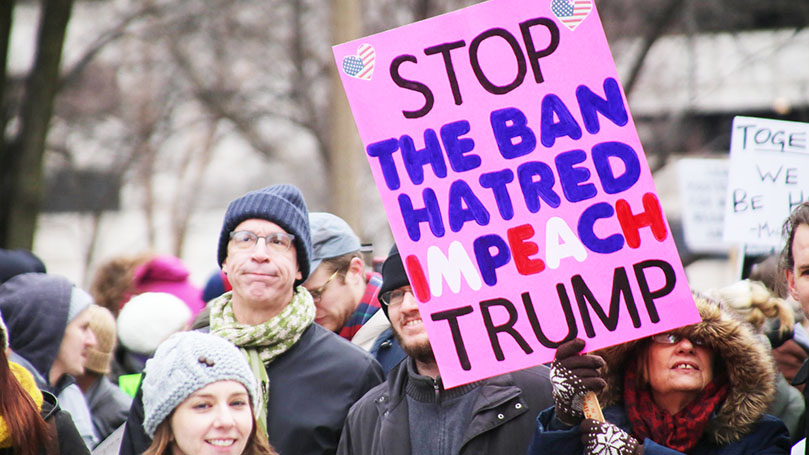
Editor’s note: This article responds to the November 2019 discussion question on political independence, working-class leadership, and the fight for democracy.
In my critical judgment, for too long the radical left generally, and American communists specifically, have endorsed what Lenin, speaking of Russia in the period prior to the great Bolshevik Revolution, called “reactionary Bourgeois-Democratic political tactics.” The impeachment of President Trump is possibly, but not necessarily, a present iteration of late nineteenth-century bourgeois-democratic (i.e., middle-class) political compromises—compromises that fundamentally hinder, rather than further, the revolutionary aims of a contemporary, unified, and authentically Marxist-Leninist people’s movement. In other words, we are proletariats playing a bourgeois game, on a bourgeois field, and according to bourgeois rules, and although we have no control over the reality of the game or the field, we do have control over whether we follow the opposing class’s reactionary and retrograde rules.
As Lenin notes in Two Tactics of Social-Democracy in the Democratic Revolution, one more opportunistic compromise represents one more moment of delay in the historically, objectively, and logically inevitable dissolution of the capitalist system and the development of a uniquely American form of socialism. And occasionally we must admit, perhaps painfully, and with a wince, that the working class is suffering not so much from capitalism itself as from the inadequate development of both. We must always remember to take action in accordance with the objective laws of the social organism’s necessary developmental trajectory if we are to base our political practice on scientific knowledge.
In my estimation, the “imprint” of the proletariat, of true working-class leadership, is currently shallow, if not simply invisible, because (to extend the printing metaphor) the proletarian press is uncalibrated, mostly obsolete, and bereft of ink. In more literal terms, American communists do not have the sufficiently elaborated Marxist-Leninist theoretical and critical resources necessary to produce a properly scientific model of the current sociocultural and political-economic situation in relation to Trump’s policies, fascist ideology, and the radical right movement more generally. As a result, we revolutionary theoreticians lack an adequately scientific conception of what practical political strategies and tactics are presently required to clear the way for a truly socialist (i.e., free, equal, fraternal, and labor-oriented) contemporary American society.
It may be objected, of course, that impeaching Trump is, or should be, the most evident and exigent concern for American communists—given his unabashedly racist, misogynistic, homophobic, and narcissistic personality—as well as for the larger leftist global movement against conservative, fascist, and alt-right political, social, and ideological movements. This appears to be correct. However, as Marx demonstrates again and again in his analyses in Capital, objective appearances—that is, what seems obviously to be the case—are typically mirages, ideal images produced by the very reality of the underlying capitalist system itself.
Based on what critical-theoretical propositions—or even perhaps unconscious assumptions—are we basing the judgment that Trump is a mouthpiece for the neo-Confederate right? As the Hegelian Marxist Slavoj Žižek noted in a 2016 Guardian Live event,
Trump is a paradox: he is really a centrist liberal, and maybe even in his economic policies closer to the Democrats, and he desperately tries to mask this. So the function of all of these dirty jokes and stupidities is to cover up that he is really a pretty ordinary, centrist politician.
To get to the essence, and not merely the appearance, of our current situation—and in order to make a deep proletarian imprint in the movement away from the radical right and further toward the radical left—we intellectuals of the working class need to make a self-conscious and self-critical effort to develop a coherent, scientifically sound theory of the present, one based on the objective laws of social development as introduced and explicated according to the developmental permutations in the capitalist structure by the geniuses of Marxist theoretical practice (e.g., Marx, Engels, Lenin, Gramsci, Althusser, Mandel, Jameson, Žižek). In more orthodox terminology, what the people’s movement desperately needs to make its imprint on the present struggle for socialism is the further theoretical elaboration of dialectical and historical materialism. It is in this way, and in this way only, that communist intellectuals will produce a map of our political-economic reality, which can then be strategically used to make our proletarian imprint as deep, real, and historical as is practically possible.
Without such a “cognitive map” (in Fredric Jameson’s useful concept), we will not have the vision to see whether the impeachment of Trump is, in the last analysis, revolutionary or reactionary. Simply nixing Trump merely opens a vacuum in which another, perhaps more neo-Confederate politician can rise to political prominence and power. As Yeats so poetically asked at the end of The Second Coming, “And what rough beast, its hour come round at last, / Slouches towards Bethlehem to be born?”
We need an updated revolutionary theory to make our imprint on history effective and durable, for, in Lenin’s pithy judgment, “without revolutionary theory there can be no revolutionary movement.” This world-historical task is essential if the Communist Party USA is to remain the American vanguard of the working-class and people’s movement.
Long live the global proletariat!


 Join Now
Join Now